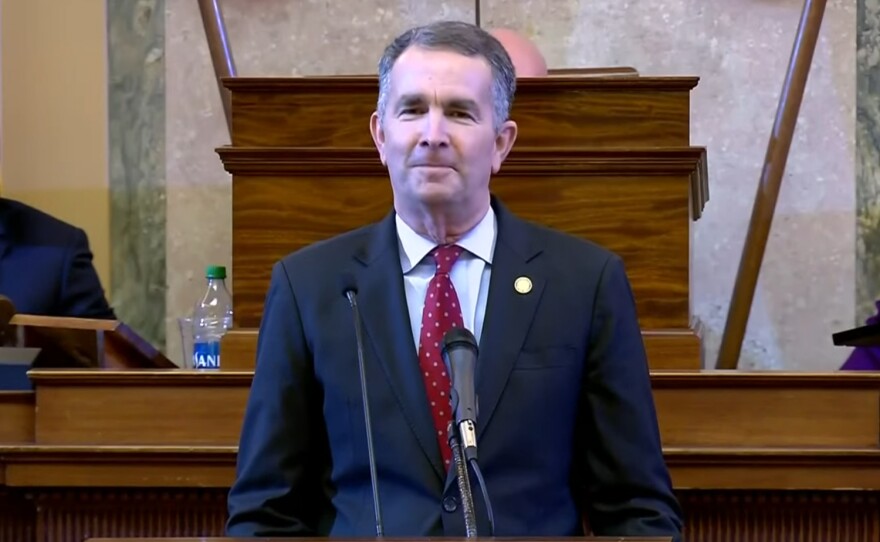Gov. Ralph Northam continued to pitch himself as Virginia’s most progressive governor during Wednesday’s State of the Commonwealth address. He touted reforms passed primarily by Democrats over the past two years and appealed to lawmakers to use nearly $4 billion in state reserves to “catch up on long-delayed investments.”
“If you asked me who we are in Virginia, I would tell you we are people who care about each other. We try to treat each other right. We want our neighbors to succeed, just as much as we want that for ourselves,” Northam said. “We know that it’s not enough for me to be doing OK — you need to be doing OK, too. And our policy choices are rooted in who we are — people who want the best for others.”
Northam’s address before the General Assembly capped the first day of Virginia’s 2022 legislative session and was his final of four such speeches. He leaves office this upcoming Saturday, when Gov.-elect Glenn Youngkin will be inaugurated.
Following two years of divided government to start his term, Democrats seized majorities in both houses of the legislature for Northam’s final two years. They passed a slew of progressive reforms such as an increase in the state’s minimum wage and abolishing the death penalty. Youngkin partially credits his November win, against former Gov. Terry McAulliffe, to a purported backlash against these policies.
Northam, however, told VPM News last week that he believes he would have beaten Youngkin if not for Virginia’s term limits, which prevent governors from serving consecutive terms. On Wednesday, he claimed that under his leadership, Virginia has become a stronger, more equitable state.
“We have built a state that helps people who need it — whether they need health care or cleaner water or to keep a roof over their head during a global pandemic,” he said. “We have built a state that recognizes the wrongs of the past and works to reckon with and rectify them.”
Liberal activists, however, have often criticized the Northam administration for not pushing for policies they see as necessary to combat issues including housing affordability and police violence.
Virginia carries a large surplus into this year’s budgeting process; the state’s tax collections are far ahead of projections thus far this year. Northam ascribed that to the state’s strong economic position. It was ranked “best for business” by CNBC in each of the last two years. It’s also risen up rankings of states’ labor policies, moving from last to 23rd in Oxfam America’s ranking of the best states for labor.
Northam called on lawmakers to continue pushing for policies he says set the state on the right track.
“Are we going to keep up this progress? Or will we retreat, become people who are more worried about ourselves than each other?” he posed. “I hope we will not. I hope the spirit of helping other people continues to prevail. I hope we’ll continue to be people who want to serve the world, rather than conquer it.”
In their response to Northam’s statement, Republican lawmakers said they, along with Youngkin, will bring a “common sense” agenda to the legislative session. Del. Tara Durant (R-Spotsylvania) said that would include measures to curtail gun violence without “resorting to gun control.”
New Speaker of the House Todd Gilbert (R-Shenandoah) has pitched bringing Operation Ceasefire, a crime-prevention strategy that focuses heavily on gang violence, to Virginia to help curb gun deaths. Most gun deaths, however, are suicides, not homicides.
Durant also said the GOP caucus plans to push for using Virginia’s surplus to provide tax cuts. Youngkin has repeatedly claimed the surplus shows the commonwealth overtaxes its citizens.
“We plan to cut taxes by ending the grocery tax, and refunding part of Virginia’s surplus to those who paid it – the taxpayers,” she said. “And we’re going to double the standard deduction, putting more money back in paychecks.”
Economic experts say Youngkin’s tax proposals could cost the state nearly $3 billion each year.












